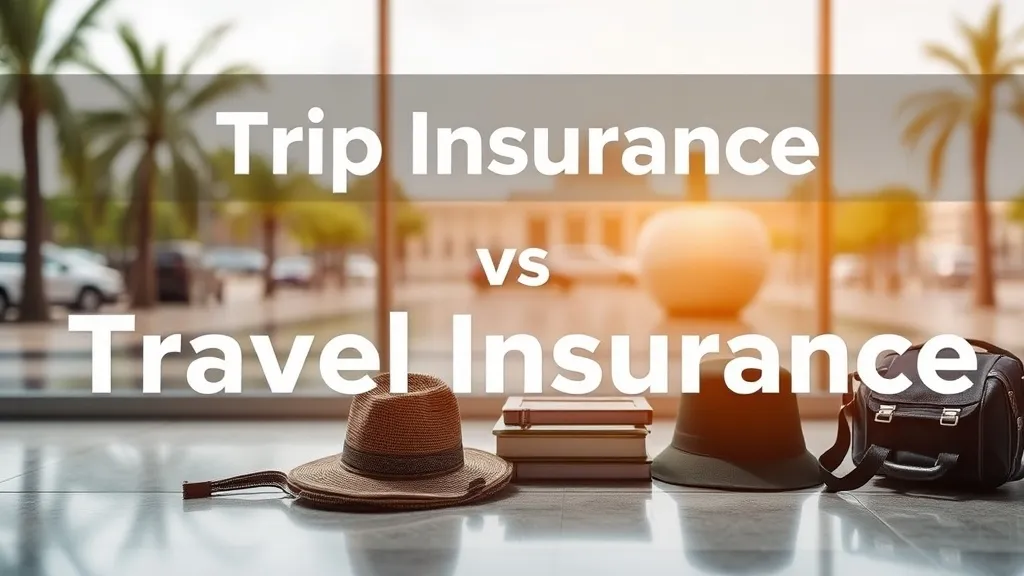Trip Insurance vs Travel Insurance: What’s the Diff?
You’ve planned the perfect getaway, but you’re also wondering if trip insurance travel really covers those “what if” moments. You’re not alone. Nearly 40% of travelers face unexpected hiccups from cancellations to lost baggage each year. (Source: Squaremouth) Here’s the thing: choosing the right policy can save more than just money—it can save your sanity.
In this guide you’ll learn exactly how trip insurance and travel insurance differ, what each covers, and how to pick the best option for your next adventure. Ready to travel smarter?
We’ll dive into definitions, compare coverage details, break down pricing factors, point out common mistakes, and even peek at future trends in 2025. Buckle up—it’s going to be a smooth ride.
Table of Contents
- Understanding Definitions: Trip Insurance vs Travel Insurance
- Coverage Comparison: What’s Included?
- Cost Factors: Why Prices Vary
- When to Choose Trip Insurance vs Travel Insurance
- Future Trends in 2025 and Beyond
- FAQ
- What is the main difference between trip insurance and travel insurance?
- How much does travel insurance cost?
- Can I buy travel insurance after booking?
- Is medical coverage included automatically?
- Where can I compare policies?
- Conclusion
- Related Articles
Understanding Definitions: Trip Insurance vs Travel Insurance
You might be wondering: are trip insurance and travel insurance interchangeable terms? The truth is, they often overlap but can focus on different aspects of your journey.
Trip insurance typically zeroes in on prepaid, non-refundable costs like flights, hotels, and tours. Travel insurance tends to be broader, adding medical coverage, evacuation, and assistance services. In other words, trip insurance is a subset of travel insurance—kind of like a mini-me.
Here’s how they break down:
- Trip Insurance: Protects financial losses for canceled or interrupted trips.
- Travel Insurance: Includes trip protection plus medical, emergency evacuation, and sometimes baggage coverage.
Imagine you’ve prepaid $5,000 for a safari. Trip insurance reimburses that if you cancel. But travel insurance goes further—covering a sudden illness overseas or a last-minute evacuation.
“Comprehensive travel insurance plans now offer broader protections than ever, covering not just medical emergencies but also trip cancellations and interruptions, which are critical in today’s uncertain travel environment.” – Insurance Industry Analyst
Coverage Comparison: What’s Included?
Understanding coverage details is key because policy jargon can be confusing. Let me explain in simple terms.
Both policies might cover:
- Trip cancellation (up to 100% of trip cost)
- Trip interruption (up to 150% of trip cost)
- Baggage loss or delay
- 24/7 assistance services
Travel insurance usually throws in these extras:
- Emergency medical and dental
- Medical evacuation and repatriation
- Optional add-ons (Cancel For Any Reason, Adventure Sports)
For a weeklong European cruise, trip insurance might cover your canceled cabin fees. But if you break an ankle on a hiking excursion, only travel insurance will fly you home safely.
Cost Factors: Why Prices Vary
Here’s where arithmetic meets unpredictability. You’ll pay more if:
- You’re older (health risks increase premiums).
- Your trip is longer (more days, more disruption risk).
- Your coverage limits are higher (bigger safety net).
- You choose multi-trip plans (annual policies often cost more upfront but save frequent travelers money).
For example, a 30-year-old on a one-week trip might pay 5% of trip costs for full travel insurance. A 65-year-old on the same trip could see rates closer to 10%.
When to Choose Trip Insurance vs Travel Insurance
Still scratching your head? Ask yourself these questions:
- Have you prepaid significant trip costs? If yes, you need trip cancellation coverage.
- Are you traveling to regions with high healthcare costs? Medical coverage is non-negotiable.
- Do you plan multiple trips in 12 months? Consider an annual travel insurance plan.
For beach vacations close to home, trip insurance may suffice. But if you’re backpacking across multiple countries or over 30,000 feet up on a mountain, opt for comprehensive travel insurance.
Future Trends in 2025 and Beyond
Travel insurance is evolving fast. Here’s what to watch for:
- Increased customization: More add-ons like Interrupt For Any Reason (IFAR).
- App-based digital claims: Faster reimbursements via mobile photo uploads.
- Heightened fraud alerts: Be wary of unsolicited calls offering “unbeatable” rates.
- Rising popularity of multi-trip plans: Frequent travelers want one policy to rule them all.
Interestingly enough, insurers are also exploring AI to predict traveler behavior and tailor premiums—think dynamic pricing based on real-time data.
FAQ
What is the main difference between trip insurance and travel insurance?
Trip insurance covers prepaid, non-refundable trip costs for cancellations or interruptions. Travel insurance includes trip coverage plus medical emergencies, evacuations, and assistance services.
How much does travel insurance cost?
Expect to pay 4%–10% of your total prepaid trip expenses for a comprehensive plan. Factors include age, trip length, coverage limits, and policy type.
Can I buy travel insurance after booking?
Yes—but for full trip cancellation benefits, purchase within 10–21 days of your initial deposit (check your insurer’s “cancel for any reason” window).
Is medical coverage included automatically?
Not always. Many trip insurance plans omit medical coverage. Always verify or add a medical rider if you’ll be abroad.
Where can I compare policies?
Use aggregator sites or consult independent brokers to compare real quotes and coverage details.
Conclusion
Understanding the nuances of trip insurance travel is your ticket to a worry-free journey. We covered definitions, detailed coverage comparisons, cost drivers, purchase timing, and future trends—all to empower your next trip decision.
Ready to act? Here’s your next move:
- List prepaid, non-refundable expenses to know your trip insurance needs.
- Shop for comprehensive travel insurance if you need medical and evacuation coverage.
- Buy within the early-purchase window to qualify for full cancellation benefits.
The bottom line is: both trip insurance and travel insurance protect you, but at different levels. Choose wisely, pack your bags, and enjoy your adventure with confidence.





